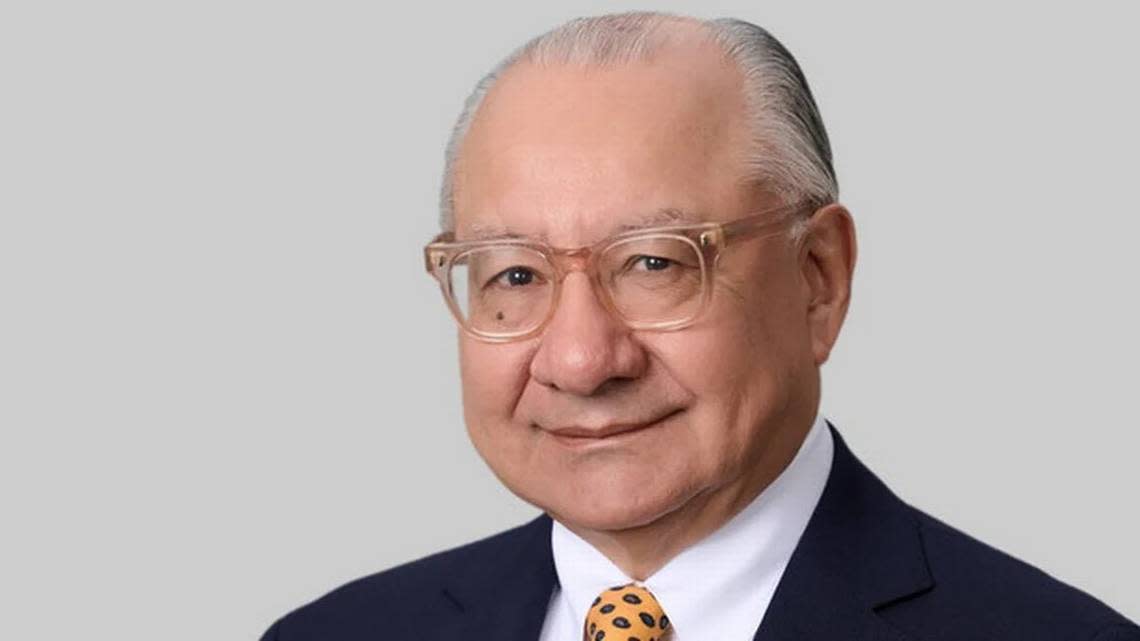Former diplomat appears in Miami federal court, pleads not guilty to Cuba agent charges

Former U.S. diplomat Victor Manuel Rocha eluded detection as a Cuban agent for decades, authorities say, until the FBI uncovered his secret past in a sting operation that led to his arrest at his home in Miami in December.
More than two months later, Rocha pleaded not guilty on Friday to a 15-count indictment at his arraignment in Miami federal court.
Asked by U.S. Magistrate Judge Edwin Torres whether he understood the charges, Rocha said: “I do, your honor.”
Rocha, who was cuffed and wearing a khaki detention uniform, is the former U.S. ambassador to Bolivia. He spent two decades at the U.S. State Department until he left the diplomatic service in 2002, and then worked in the private sector for two more decades before being arrested in Miami in early December.
Rocha, 73, is charged with violating the Foreign Agents Registration Act, which requires those working under the control of a foreign government to notify the U.S. Attorney General’s office. Rocha faces charges of conspiracy, acting as a foreign agent, wire fraud and making false statements to obtain and use a U.S. passport, according to the indictment.
His attorney, Jacqueline Arango, entered Rocha’s plea with him and requested a jury trial. The unusual delay in his arraignment suggested to legal experts that his endgame will be a plea deal. After the brief arraignment, Arango declined to answer questions.
Since his arrest, Rocha has remained at the federal detention center, after agreeing to prosecutors’ demands that he be held before trial. They argued he is a danger to the community and a flight risk. If convicted, he faces years in prison and the loss of certain assets that can be traced to his alleged criminal activity as a Cuban agent over the past four decades.
After being charged in December, Rocha transferred the deeds on four luxury Brickell City Centre condos that he bought with his wife, Karla Wittkop Rocha, exclusively to her, according to records filed on Feb. 8, with the Miami-Dade County Clerk’s office. The documents were originally signed in January.
The quit-claim deed transfers were first reported by local Spanish-language station America TV.
The Rochas’ two units in the Rise tower and two units in the Reach tower, located at the Brickell City Centre in downtown Miami, are valued at more than $4 million in total, according to the real estate website Zillow.
Arango, the Miami attorney with the firm Akerman who is representing Rocha and formerly worked as a longtime federal prosecutor, signed the deed transfers as a witness. Asked after Friday’s arraignment whether the deed transfers might be fraudulent, Arango declined to answer.
According to the federal indictment, if Rocha is found guilty the government would seize any property “derived from any proceeds obtained, directly or indirectly from the commission of such offense.” Nelson Rodriguez Varela, a Miami attorney specializing in criminal and real estate law, said the property transfers were “curious,” though he stressed that Rocha is presumed innocent until found guilty or he pleads guilty to some or all of the charges.
“If he did that in order to defeat any government attempt to take his interest in the property if he is found guilty, I don’t think he would be successful because he cannot transfer his equitable interest in the property because he is married,” he said.
People who knew Rocha described him as someone preoccupied with money. He told acquaintances that he left the federal government to pursue better-paid positions in the private sector. He worked as senior business advisor at the Miami law firm Foley & Lardner, senior vice president for Xcoal, a coal exporting company, and as senior vice president for Latin America at Canadian firm Barrick Gold Corp.
Although Rocha was not charged with espionage, the U.S. Justice Department accused him of working as an undercover agent of Cuba’s General Directorate of Intelligence. The indictment accuses him of using his position to obtain sensitive information and pass it to Cuba, though it does not provide any details about what damage he may have done or the sort of secrets he revealed. A document attached to the indictment has been sealed by the court.
The case sent shockwaves through the diplomatic and intelligence communities, where Rocha was highly regarded as an expert on Cuba and Latin American affairs. In Miami circles he was known as a fervent Republican and an admirer of former President Donald. Trump, although the indictment says Rocha was taped by an FBI undercover agent claiming his “right-wing” persona was part of his cover as a Cuban agent.
The delay in Rocha’s arraignment, which was postponed twice, suggested to legal experts that he might have been negotiating a plea deal with prosecutors in the U.S. Attorney’s Office. U.S. District Judge Beth Bloom has set trial for March 25 in Miami.

